Physics
Physics is the study of matter, energy, and the interactions between them. It is a fundamental science that seeks to understand the natural world and the principles that govern it.
Key Concepts in Physics
- Motion and Forces: Physics studies the motion of objects and the forces that cause them to move.
- Energy: Physics explores the different forms of energy, such as kinetic energy, potential energy, and thermal energy.
- Electricity and Magnetism: Physics investigates the behavior of electric charges and magnetic fields.
- Waves and Optics: Physics examines the properties of waves, including light and sound waves, as well as the behavior of light.
- Modern Physics: This area of physics includes topics such as relativity, quantum mechanics, and nuclear physics.
Study Tips for Physics
- Understand the Fundamentals: It's important to grasp the basic concepts and principles of physics, such as Newton's laws of motion, the conservation of energy, and the laws of thermodynamics.
- Practice Problem-Solving: Physics involves a lot of problem-solving, so practice solving different types of problems to solidify your understanding of the material.
- Use Visual Aids: Visual representations, such as diagrams and graphs, can help you understand complex concepts in physics.
- Stay Updated: Keep up with the latest developments in physics by reading scientific journals and following news in the field.
- Seek Help When Needed: If you're struggling with a particular concept, don't hesitate to ask for help from your teacher or a tutor.
Branches of Physics
Physics is divided into several subfields, including:
- Classical Mechanics: The study of the motion of objects and the forces acting on them.
- Thermodynamics: The study of heat and its relation to energy and work.
- Electromagnetism: The study of electric and magnetic fields and their interactions with matter.
- Relativity: The study of the behavior of objects at high speeds or in strong gravitational fields.
- Quantum Mechanics: The study of the behavior of particles at the atomic and subatomic levels.
Understanding the key concepts, study tips, and branches of physics will help you build a solid foundation in this fascinating field of science.
.◂Science Worksheets and Study Guides Sixth Grade. Magnetism
Study Guide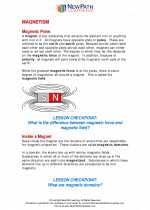 Magnetism
Magnetism  Activity Lesson
Activity Lesson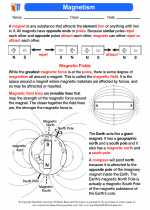 Magnetism
Magnetism  Worksheet/Answer key
Worksheet/Answer key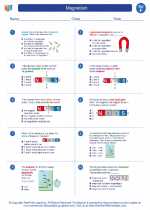 Magnetism
Magnetism  Worksheet/Answer key
Worksheet/Answer key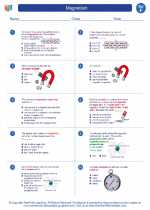 Magnetism
Magnetism  Worksheet/Answer key
Worksheet/Answer key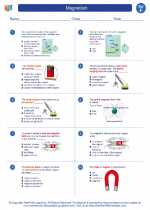 Magnetism
Magnetism  Worksheet/Answer key
Worksheet/Answer key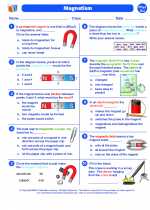 Magnetism
Magnetism  Vocabulary/Answer key
Vocabulary/Answer key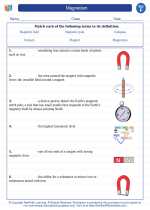 Magnetism
Magnetism 

 Activity Lesson
Activity Lesson
 Worksheet/Answer key
Worksheet/Answer key
 Worksheet/Answer key
Worksheet/Answer key
 Worksheet/Answer key
Worksheet/Answer key
 Worksheet/Answer key
Worksheet/Answer key
 Vocabulary/Answer key
Vocabulary/Answer key

The resources above cover the following skills:
EARTH AND SPACE SCIENCE
Earth’s Systems
Develop and use models of Earth’s interior composition to illustrate the resulting magnetic field (e.g., magnetic poles) and to explain its measureable effects (e.g., protection from cosmic radiation).